

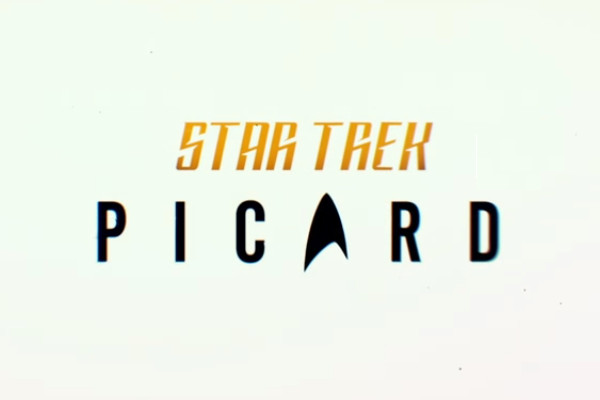
Released from January-March 2020, the series can be watched on Amazon Prime. As a warning for those who have yet to see it, then this article does contain spoilers. Please join me as I rank the entire season from worst to best...
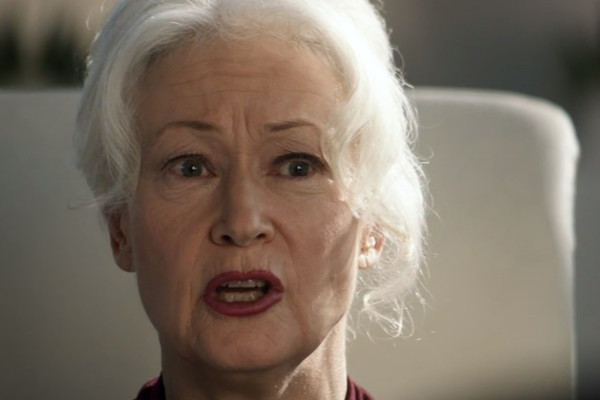
The episode where Federation Admiral Kirsten Clancy uses a word that's often censored, even on this site. There was always a kind of unspoken rule that Star Trek lived in some kind of hermetically sealed private universe, along with original Doctor Who, where swear words simply didn't exist. Okay, there was that time that Harry Mudd in the original show said "bloody", and the many instances of Picard saying "shit" in French during The Next Generation, but generally speaking, this was a show that the whole family could watch.
It's not prudish to decry such things. There's nothing wrong with a series that families can watch without hearing bad language. But just as Star Trek: Discovery has added the f-bombs to its roster, and the new, painfully self-aware version of Doctor Who has characters talking about prostitutes and erections, Picard here gets told off for his "sheer fucking hubris." The Wire is a huge favourite here at The Anorak Zone, but with its adults-only timeslot and radically different worldview, it's to be expected. But there's no need at all for a Star Trek series to go out with a "15" certificate.
Yet it's not just a sense that this is no longer a programme your parents could watch, it goes beyond that. The idea of a cynical, embittered universe where people talk like they belong in the 21st century, not the 24th, tears down any serious world-building that the history of the franchise has established. While the series is not without its better moments (as we'll eventually get to) it's fundamentally misconceived that an action-based TV show is based around a man who's nearly 80. With all the laser zap, swearing and explosions, Picard often looks out of place in his own programme.
This second episode was written by Executive Producer Akiva Goldsman, a man who gave the world scripts for Batman & Robin and Lost In Space. It's a bad clashing of two separate worlds, where Star Trek - a thoughtful, somewhat twee programme that was never, ever cool - meets a Hollywood sensibility of hollow spectacle and underwritten characters. The end result isn't satisfying to either convention.
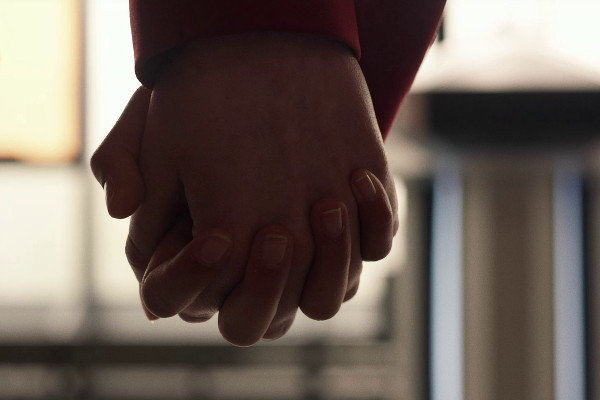
Not, strictly speaking, an episode of Picard at all, Short Treks was a series of shorts designed to promote Discovery and featured characters from that programme. However, this particular episode acts as a prelude to Picard, whereby an android attack on Mars, featured in the show, is here shown from the point of view of two young schoolgirls.
Unfortunately that point of view seems to be mainly having a fight to the tune of Peter Gabriel's cover of "Heroes" before holding hands when they realise their parents have been killed in the Mars attack. Quite what the relevance of song choice is, or why this 8m short would have enticed anyone to tune in to the series proper is open to question.
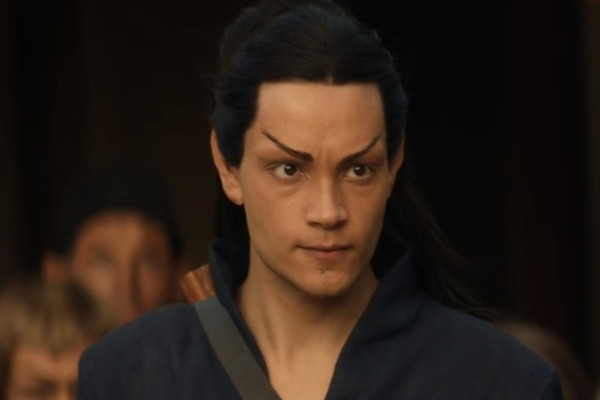
Television has changed a lot in the 26 years since The Next Generation ended. The world itself has changed, and Picard now airs on special subscription channels like CBS All Access and Amazon Prime. While the decision to release the series episodically rather than allow a Netflix-style bingewatch is a bit of a throwback, perhaps the distributors felt that people wouldn't be able to take all the excitement of watching ten episodes in one sitting.
But the biggest change is not how the series is broadcast, but the move away from self-contained episodes and into story arcs and season-length, continuous narratives. It's not implicitly a bad thing, as some Next Generation episodes struggled to tell a tale with a fleshed out beginning-middle-end in just around 45 minutes. But the real sticking point with Picard, certainly the first half of the season, is that it's slow. Really slow.
The programme takes many diversions and goes off at tangents, prolonging events so much that it takes six episodes before the two main characters finally meet; episode two even has Picard finding out at length what viewers were already shown in the first episode. This is the difference between "slow build" and "moving at an ice age"; a meandering, listless tale that takes forever to get to the point. Essentially it's like watching an episode of Star Trek as told by your gran.
Absolute Candor introduces "Elnor", a kind of 24th century Samurai who exists as little more than a plot device to watch Picard's back in the action scenes he's no longer really capable of taking part in. Often Patrick Stewart seems to be playing himself more than Jean-Luc, and it's hard to really see the core character within him. Although this isn't the first time that Picard's character has shifted considerably - the hit-and-miss Next Generation films restyled him as an action hero - this is the first time he's looked so lost.
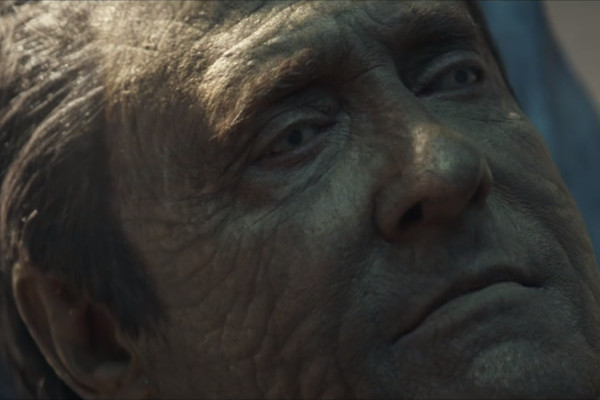
The series finale, which contains a climactic battle between a fleet of over 200 Romulan Warbirds and giant space orchids that can float and crush starships, while two women decide they want to have lesbian relations with Voyager's Seven of Nine, one when she's in the middle of trying to kill her. Picard and crew, wanting to stop the Romulans from destroying an android colony, are helped out by being given an object that can fix anything by the power of imagination. Unfortunately, in the midst of his diplomacy, Picard dies from a brain abnormality and joins Data in a virtual afterlife where he likes to listen to Irving Berlin songs while wearing a smoking jacket. However, Picard has to leave when it turns out they've copied Picard's mind and placed his consciousness into an android body, which Picard readily accepts and then gets right back to work.
The appropriate phrase here is "no, honestly." There's a quote from this episode where one character asks another what's happening, and gets the response "nothing that makes any sense." Perhaps the only relatable moment which doesn't conjure up a response beginning with the words "what the" and ending in the kind of word used by Admiral Clancy is a scene where Picard, android Soji, Romulan Commodore Oh and a returning Riker all get together to talk it over on view screens. Considering the show reputedly cost over $8 million an episode, it does look remarkably like a low-rent Zoom meeting that many of us have been forced into during lockdown.
There's not really a lot else to say about this complete shambles of a finale, except to note that the Romulan request for "planetary sterilisation pattern number five" wouldn't have been much of a hit for Lou Bega.
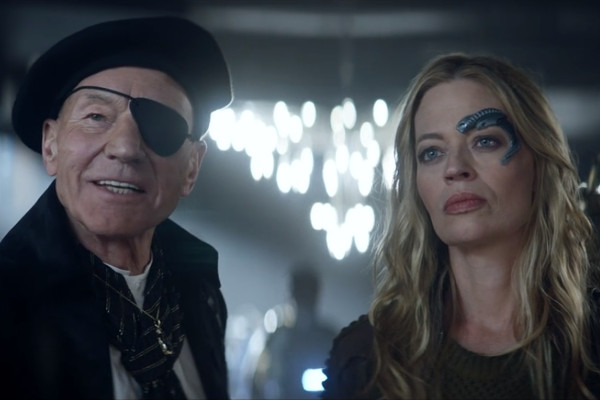
The core storyline of Picard is that Jean-Luc has discovered a covert Romulan plot so top secret that only half the cast know about it. After discovering that Data had two "daughters" and one of them is killed on Earth, he assembles a crew of crudely-drawn archetypes to help him travel to find Soji, her twin sister.
The crew members range from Santiago Cabrera's ship pilot "Rios" (a kind of Primark Han Solo) to Alison Pill's "Agnes Jurati", a cybernetics doctor who often speaks like an airhead. There's also a close old friend of Picard's, unknown to viewers, in the form of embittered, hard-drinking "Raffi" (Michelle Hurd). Together these characters - who often seem to change motivation and personality from scene to scene - must help Picard on his illegal mission, Star Fleet having turned Picard and his hubris (fucking or otherwise) down.
Guest star in this episode is Jerry Ryan as Seven of Nine, forced to utter dialogue you only hear in movie trailers as a counterpoint to Picard's unlikely sermonising. This is a point where the programme forces itself into shapes to satisfy Star Trek fans rather than tell a story, given that Picard and Seven Of Nine have never met, but the viewers will recognise her from Voyager.
Stardust City Rag ranks as high as it does simply because it has a certain "so bad it's good" quality, vaguely reminiscent of the Blake's 7 episode Gambit. However, attempts at comedy are clumsy and misguided. It's never been made clear how a Frenchman speaks in an English accent, but here Picard goes undercover, putting on a fake French accent as a disguise. Unfortunately it's less like Picard using subterfuge, more like the version of Patrick Stewart from Extras doing his best Marcel Wave impression. The lack of inherent drama in this set up can be gleaned from the fact that there's a gun standoff in a crowded bar and no one takes any notice. Even in Eastenders the pub jukebox stops to take a look.
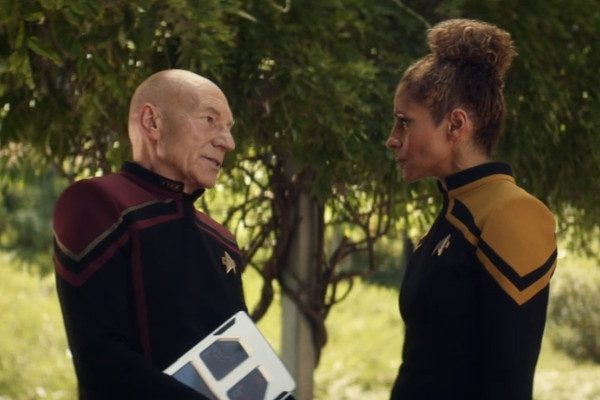
An almost ironic title, given that it's three episodes in and the story has yet to emerge from a cocoon of exposition and laboured sentiment.
It opens with a "14 years earlier" flashback between Picard and Raffi, whose insistence on calling him "JL" is inexplicably irritating. Possibly it's just that after over 30 years of "knowing" Picard, it's possible to feel a little proprietorial over him, and seeing a stranger being familiar with him seems slightly wrong. Perhaps it's also that Raffi fits into that unedifying sci-fi trope: the "old friend" we've never met before.
With the flashback taking place in 2385, this places it just six years after Nemesis, a Next Generation movie where Stewart was still relatively vibrant. Unfortunately 18 years have passed in real time, and there appears to have been minimal effort to disguise Stewart's appearance. What should have been a still relatively sprightly man in his mid 60s is instead only too clearly played by a much frailer man nearing his 80th birthday.
In fairness, the last episode does establish that Picard is significantly older than the actor who plays him, and is actually supposed to be in his early 90s - but this still doesn't explain the huge disparity between the film version and a man who's supposed to be that same person, just six years on.